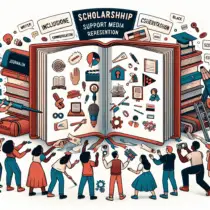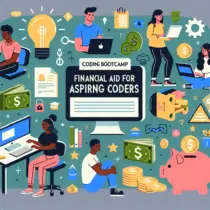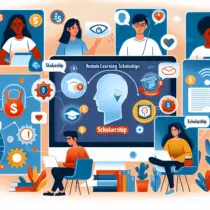Scholarships Supporting Cultural Diversity and Media Representation
The world of academia is evolving rapidly, acknowledging the increasing importance of cultural diversity and media representation. Scholarships supporting cultural diversity and media representation play a critical role in fostering a more inclusive environment in education and media. These scholarships provide financial assistance while promoting diversity, enriching educational experiences, and enhancing media portrayal.
Exploring Financial Avenues: Unleashing the Power of Scholarships for Online Students
Financial barriers can hinder students from achieving their academic goals. Scholarships are essential in alleviating these challenges. Online students, who often juggle multiple responsibilities, greatly benefit from these financial aids. Scholarships make higher education more accessible for them, promoting a more inclusive academic landscape.
For example, the Diversity and Media Scholarship offers financial assistance of $1,000 to online students who demonstrate a commitment to diversity and inclusion through their academic and extracurricular activities. This scholarship aims to support students pursuing online courses while encouraging them to contribute positively to media representation in their respective fields.
Cultural Diversity in Education
Education is a powerful tool for fostering cultural diversity. Scholarships play a crucial role in facilitating access to education for students from diverse backgrounds. These scholarships celebrate multiculturalism, promoting a more inclusive and enriched learning environment.
The Gates Millennium Scholars Program is one such initiative that supports students from underrepresented communities. Funded by the Bill & Melinda Gates Foundation, this scholarship provides full financial support to high-achieving students from minority backgrounds, ensuring they have access to quality education while promoting a diverse academic community.
Media Representation and Its Importance
Media representation shapes public perception and influences societal norms. Diverse and accurate representation in media contributes to social cohesion and mutual understanding. Scholarships supporting this cause empower students to create content that reflects the true diversity of society.
The Disney/ABC Television Group’s Media Scholarship recognizes this importance. It offers financial assistance to students who demonstrate a commitment to enhancing diversity in media. Recipients are encouraged to create content that represents varied cultural perspectives, promoting a more inclusive media landscape.
$2,000 Environmental Sustainability Grant Germany 2024
Environmental sustainability is another crucial area where cultural diversity and media representation intersect. Scholarships like the $2,000 Environmental Sustainability Grant Germany 2024 provide opportunities for students passionate about sustainability to explore this field further. This grant is awarded to students who propose innovative projects that address environmental challenges while promoting cultural diversity and inclusion.
For instance, a student might propose a project highlighting the environmental practices of indigenous communities, thereby integrating cultural diversity and sustainability. Through such initiatives, scholarships not only support education but also encourage the development of projects that have a broader societal impact.
Prominent Scholarships Promoting Cultural Diversity and Media Representation
Several scholarships are specifically designed to promote cultural diversity and positive media representation. The Fulbright Program, for instance, is renowned for its commitment to cultural exchange and academic excellence. This program offers grants to students from around the world, fostering mutual understanding and collaboration across cultures.
Another notable scholarship is the Emerge Fellowship, which supports students from diverse backgrounds pursuing careers in media and journalism. This scholarship provides financial aid, mentorship, and professional development opportunities, helping students navigate the media industry while promoting diversity in media content.
Impact of Scholarships on Students and Society
Scholarships supporting cultural diversity and media representation have a profound impact on students and society. They enable talented individuals from different backgrounds to pursue their educational and professional aspirations, leading to personal growth and development.
On a broader scale, these scholarships contribute to a more inclusive and equitable society. By promoting diversity in education and media, they help break down stereotypes and foster mutual respect and understanding among different cultural groups.
For instance, the Posse Foundation Scholarship is instrumental in this regard. It provides full-tuition scholarships to students from diverse backgrounds and forms cohorts or "posses" that support each other throughout their college journey. This initiative not only aids individual students but also promotes cultural diversity and inclusion within academic institutions.
Challenges and Opportunities
While scholarships supporting cultural diversity and media representation offer numerous benefits, challenges remain. One significant challenge is ensuring equitable access to these scholarships. Many deserving students may not be aware of such opportunities or may face barriers in the application process.
To address this issue, educational institutions and scholarship providers must implement outreach programs and provide resources to help students navigate the application process. Additionally, leveraging technology can enhance accessibility, making it easier for students to find and apply for scholarships.
On the other hand, there are significant opportunities to further amplify the impact of these scholarships. Collaborative efforts between educational institutions, governments, and private organizations can lead to the creation of more scholarships tailored to promoting diversity and media representation.
Promising Developments and Future Directions
The growing recognition of the importance of cultural diversity and media representation has led to promising developments in scholarship programs. For example, the Paul & Daisy Soros Fellowships for New Americans is designed to support immigrants and children of immigrants pursuing graduate studies. This scholarship celebrates the diverse contributions of immigrants to American society and encourages a more inclusive academic environment.
Looking ahead, the integration of cultural diversity and media representation into scholarship programs is likely to expand. Increased investment in these areas will pave the way for more comprehensive and impactful scholarships. Initiatives like the $2,000 Environmental Sustainability Grant Germany 2024 exemplify the potential for interdisciplinary approaches that incorporate cultural diversity into various fields.
Conclusion
Scholarships supporting cultural diversity and media representation are indispensable in today’s educational landscape. They provide financial assistance to deserving students, promote a more inclusive and enriched learning environment, and enhance media portrayal of diverse societies.
By exploring financial avenues and unleashing the power of scholarships, students, particularly those studying online, can overcome financial barriers and achieve their academic goals. Scholarships like the Diversity and Media Scholarship, the Gates Millennium Scholars Program, and the Fulbright Program are setting exemplary standards in promoting cultural diversity and media representation.
Moreover, interrelated grants such as the $2,000 Environmental Sustainability Grant Germany 2024 demonstrate the innovative ways scholarships can integrate cultural diversity into other significant areas like sustainability. In doing so, these scholarships create a profound impact on students and society, fostering a more inclusive and equitable world.
As we move forward, enhancing accessibility to scholarships and leveraging collaborative efforts will be crucial in maximizing their impact. With continued investment and a focus on cultural diversity and media representation, scholarships will remain a vital tool in shaping a brighter, more inclusive future for all.






